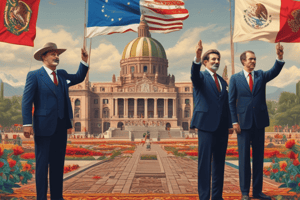Podcast
Questions and Answers
What did liberals in the 19th century primarily advocate for in terms of religion?
What did liberals in the 19th century primarily advocate for in terms of religion?
- Abolishing religion entirely
- Enforcing a single religion
- Promoting atheism
- Tolerating all religions (correct)
In what way did liberals differ from conservatives in their view of government power?
In what way did liberals differ from conservatives in their view of government power?
- Advocated for absolute monarchy
- Supported theocracy
- Opposed uncontrolled power of dynastic rulers (correct)
- Favored dictatorship
What was a key political goal of liberals in the 19th century regarding government structure?
What was a key political goal of liberals in the 19th century regarding government structure?
- Establishing a representative parliamentary government (correct)
- Supporting a totalitarian state
- Implementing an authoritarian regime
- Advocating for an absolute monarchy
What aspect of government did liberals specifically want to limit through their proposed system?
What aspect of government did liberals specifically want to limit through their proposed system?
What political stance did liberals NOT support in terms of voting rights?
What political stance did liberals NOT support in terms of voting rights?
What did radicals want in terms of government?
What did radicals want in terms of government?
What was a key aspect of conservatives' view on societal change in the nineteenth century?
What was a key aspect of conservatives' view on societal change in the nineteenth century?
What did liberals and radicals consider as the solution to issues faced during industrialization?
What did liberals and radicals consider as the solution to issues faced during industrialization?
What did industrialization bring in terms of labor to factories?
What did industrialization bring in terms of labor to factories?
What did radicals oppose in contrast to liberals regarding wealth distribution?
What did radicals oppose in contrast to liberals regarding wealth distribution?
Flashcards are hidden until you start studying
Study Notes
Political Trends of the 19th Century
- In the 19th century, people who wanted to restructure society radically were categorized as conservatives, liberals, or radicals, with distinct meanings in that context.
- These terms don't mean the same thing in all contexts or at all times.
Liberals
- Wanted a nation that tolerated all religions, unlike European states that usually favored one religion or another.
- Opposed the uncontrolled power of dynastic rulers and wanted to safeguard individual rights against governments.
- Argued for a representative, elected parliamentary government, subject to laws interpreted by an independent judiciary.
- Did not believe in universal adult franchise, wanting men of property mainly to have the vote, and did not want the vote for women.
Radicals
- Wanted a nation where government was based on the majority of a country's population.
- Many supported women's suffragette movements.
- Opposed the privileges of great landowners and wealthy factory owners, disliking concentration of property in a few hands.
- Not against private property, but wanted it distributed more evenly.
Conservatives
- Opposed to radicals and liberals.
- After the French Revolution, even conservatives accepted that some change was inevitable, but believed it had to be brought about through a slow process.
- Respected the past and wanted to preserve it.
Industrial Society and Social Change
- The 19th century saw profound social and economic changes, including the Industrial Revolution.
- Industrialization brought men, women, and children to factories, with long working hours, poor wages, and common unemployment.
- Liberals and radicals searched for solutions to issues like housing and sanitation problems in rapidly growing towns.
- Almost all industries were owned by individuals, who believed that individual effort, labor, and enterprise would lead to societal development.
Studying That Suits You
Use AI to generate personalized quizzes and flashcards to suit your learning preferences.



